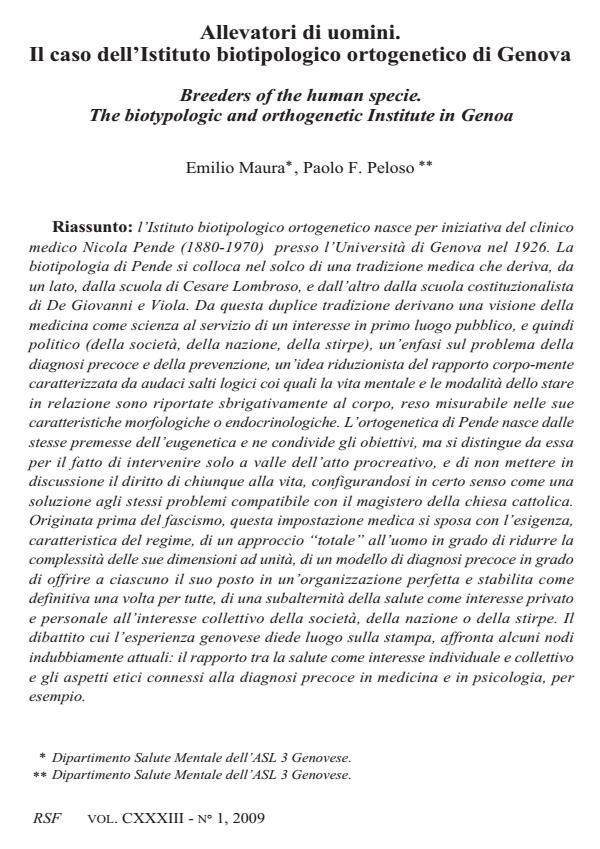Allevatori di uomini. Il caso dell’Istituto biotipologico ortogenetico di Genova
Journal title RIVISTA SPERIMENTALE DI FRENIATRIA
Author/s Emilio Maura, F. Peloso Paolo
Publishing Year 2009 Issue 2009/1
Language Italian Pages 17 P. 19-35 File size 492 KB
DOI 10.3280/RSF2009-001003
DOI is like a bar code for intellectual property: to have more infomation
click here
Below, you can see the article first page
If you want to buy this article in PDF format, you can do it, following the instructions to buy download credits

FrancoAngeli is member of Publishers International Linking Association, Inc (PILA), a not-for-profit association which run the CrossRef service enabling links to and from online scholarly content.
Allevatori di uomini. Il caso dell’Istituto biotipologico ortogenetico di Genova - The Biotypologic Orthogenetic Institute of the University of Genoa, was created, in 1926, by the Italian endocrinologist Nicola Pende (1880 -1970). Pende’s biotypology follows the Italian medical tradition, fruit of two different trains of thought: Cesare Lombroso’s medical approach and Achille De Giovanni and Giacinto Viola’s constitutionalist theory. This dual line of thought brings medical scholars to focus on public health, early diagnosis and prevention, all topics comprising a political interest in society, nation and race. Moreover, this approach involves a reductionist view of the body/mind relationship - enclosing mental and relational life in the body - and consequently allows morphological and endocrinologic measurements. Pende’s orthogenetics originates from the same premises as Eugenetics and adopts the same aims, but differs when it advocates the importance of acting after birth, so as not to infringe the tenets of the catholic church on the right of every person to live. Pende’s medical theory - outlined before the fascist era - proposes a "total" and reductive approach to the complexity of the human being, in line with the fascists’ endeavour to put each person in the right place (hence the usefulness of early diagnosis), and thus build, once and for ever, a perfect and stable social organisation. Pende’s biotypology considers public health as a priority, followed by individual health. The past debate in the media - set off by the experience of Pende’s Institute - addressed some issues discussed today : the relationship between individual and public health interests, and the bioethical features of early diagnosis in medicine and psychology. Keywords: biotypology, orthogenetics, biopolitics, constitutionalism, fascism, bioethics.
Emilio Maura, F. Peloso Paolo, Allevatori di uomini. Il caso dell’Istituto biotipologico ortogenetico di Genova in "RIVISTA SPERIMENTALE DI FRENIATRIA" 1/2009, pp 19-35, DOI: 10.3280/RSF2009-001003